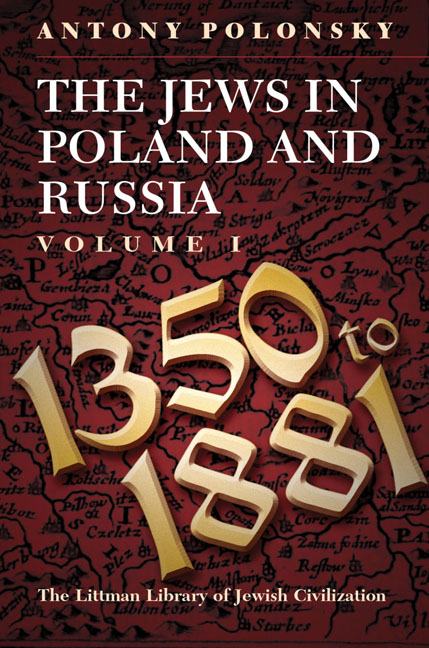Book contents
- Frontmatter
- Dedication
- Acknowledgements
- Contents
- List of Maps
- List of Tables
- Note on Transliteration
- Note on Place Names
- Maps
- General Introduction
- PART I JEWISH LIFE IN POLAND–LITHUANIA TO 1750
- PART II ATTEMPTS TO TRANSFORM AND INTEGRATE THE JEWS, AND THE JEWISH RESPONSE, 1750–1880
- Glossary
- Bibliography
- Index
12 - The Reign of Alexander II, 1855–1881
- Frontmatter
- Dedication
- Acknowledgements
- Contents
- List of Maps
- List of Tables
- Note on Transliteration
- Note on Place Names
- Maps
- General Introduction
- PART I JEWISH LIFE IN POLAND–LITHUANIA TO 1750
- PART II ATTEMPTS TO TRANSFORM AND INTEGRATE THE JEWS, AND THE JEWISH RESPONSE, 1750–1880
- Glossary
- Bibliography
- Index
Summary
Education is the slogan of our age and in its embrace the mass of poor Jews find freedom from the abnormality and humiliation of their lives.
O. GURVICH, overseer of a Vilna Jewish primary school, 1865THE GOVERNMENT AND THE JEWS IN THE ERA OF THE ‘GREAT REFORMS’
THE ACCESSION of Alexander II in February 1855 was greeted with high expectations. After the stagnation and repression of the last years of Nicholas I's reign it was believed that his successor would introduce the radical reforms whose necessity had been made obvious by Russia's poor performance in the continuing Crimean War.
Initially, Alexander seemed both eager and able to fulfil these expectations. He brought the war to an end and re-established Russia as a significant member of the European concert. He proceeded to plan for the long-overdue abolition of serfdom on the grounds that ‘It is better to abolish serfdom from above than to await the day when it will begin to abolish itself from below’, and also proposed a number of other major reforms, including the introduction of a more representative system of local government, the establishment of a new legal system with trial by jury and much more scope for legal advocacy, and the reorganization of the army. In addition, he promised to reintroduce a measure of self-government in the Kingdom of Poland.
The Jewish elite placed similar hopes in the ‘reforming tsar’. Shortly after his accession, on 31 March 1856, Alexander called on Pavel Kiselev as chairman of the government Committee for the Transformation of the Jews to conduct a comprehensive review of Russian legislation dealing with the Jews so as to facilitate ‘the merger of this people [narod] with the native population insofar as the moral status of the Jews makes this possible’. In his Coronation Manifesto of 26 August 1856 Alexander announced his intention of reforming the way in which the draft was applied to the Jewish community.
There also appeared to be a significant change in the attitude of educated Russians to the ‘Jewish question’, epitomized in an exchange that took place in the press in 1858.
- Type
- Chapter
- Information
- The Jews in Poland and RussiaVolume I: 1350 to 1881, pp. 392 - 440Publisher: Liverpool University PressPrint publication year: 2009

